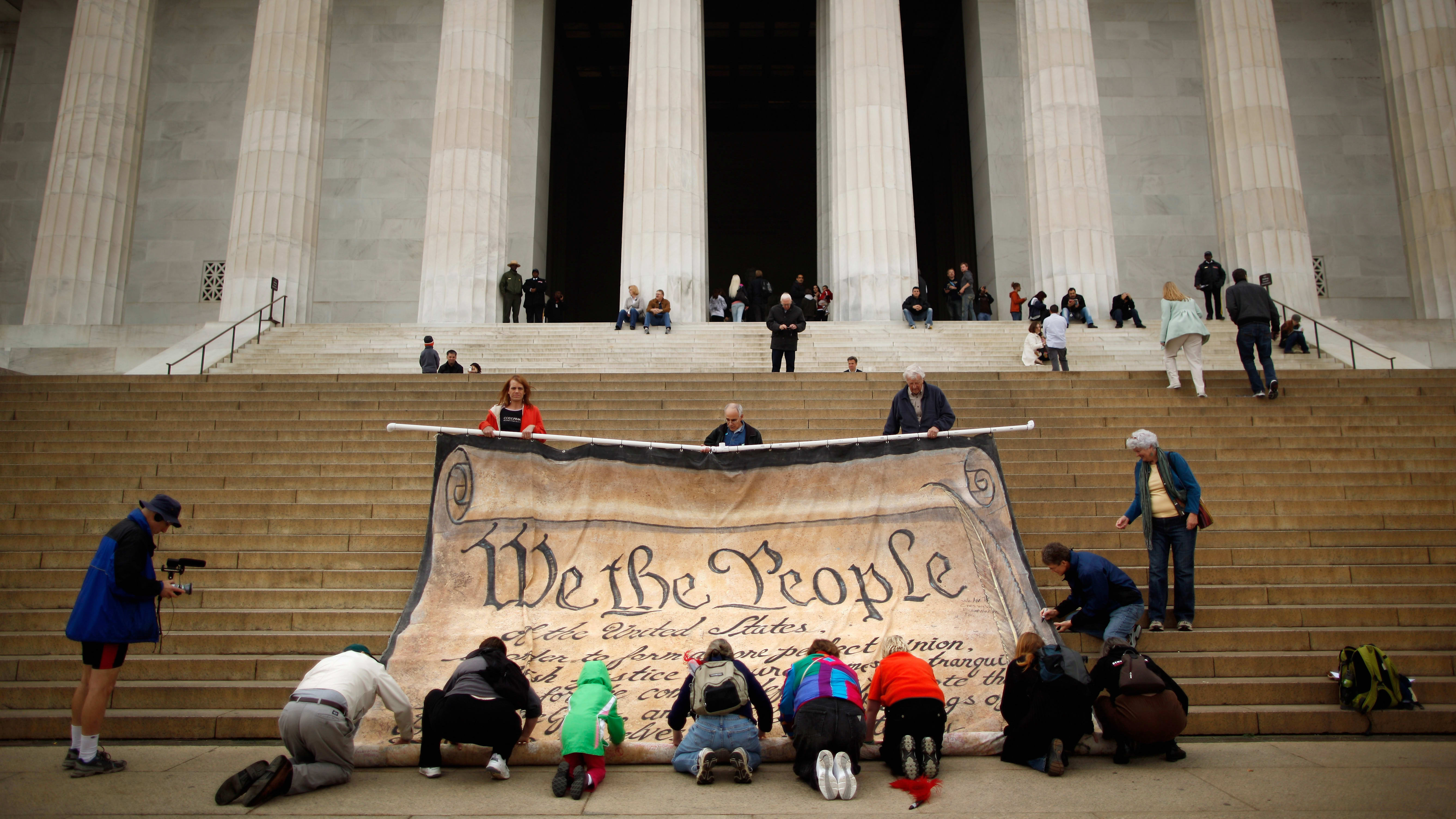Broken glass
The core principles of democratic self-rule are being shattered


A free daily email with the biggest news stories of the day – and the best features from TheWeek.com
You are now subscribed
Your newsletter sign-up was successful
At the end of a recent vacation trip to the Virginia and Maryland shore, my wife, Karla, and I made a brief detour to Washington, D.C. I felt an urge to make a pilgrimage to the National Archives to see the original copies of the Declaration of Independence, the Constitution, and the Bill of Rights. These blueprints for self-rule, liberty, and human flourishing created a flawed but resilient democracy that has endured through 246 years of sharp, often bloody disagreement, evolution, and struggle. The fragile parchments are now encased in inert argon gas under protective glass in a darkened room, where people file by in the hushed silence of a secular cathedral. It is with some awe that you inspect the familiar words in handwritten script and the signatures of George Washington, James Madison, Alexander Hamilton, Benjamin Franklin, and the rest. And you cannot help but wonder if the founding documents' design for "a more perfect union" might soon fade into irrelevance.
As David Leonhardt of The New York Times documented in disturbing detail this week, we have entered an unprecedented era in which the losers of elections no longer feel obligated to accept defeat. (See The last word, p.40.) Democracy itself has fallen into ill repute among Trumpist Republicans, who insist that the country should be governed by "real Americans" with the right religious and political beliefs, not by those who get the most votes. In this coming term, an activist Supreme Court will rule on a claim that state legislatures should have unfettered control of elections, including the right to overturn them. It is possible that in 2024 one or more states' choice for president might be reversed, so that the loser of the election can be installed as president. America has survived many other grave crises, and "we, the people" may eventually survive this one. But the protective glass is cracked, and democracy's survival is uncertain.
This is the editor's letter in the current issue of The Week magazine.
The Week
Escape your echo chamber. Get the facts behind the news, plus analysis from multiple perspectives.

Sign up for The Week's Free Newsletters
From our morning news briefing to a weekly Good News Newsletter, get the best of The Week delivered directly to your inbox.
From our morning news briefing to a weekly Good News Newsletter, get the best of The Week delivered directly to your inbox.
A free daily email with the biggest news stories of the day – and the best features from TheWeek.com
William Falk is editor-in-chief of The Week, and has held that role since the magazine's first issue in 2001. He has previously been a reporter, columnist, and editor at the Gannett Westchester Newspapers and at Newsday, where he was part of two reporting teams that won Pulitzer Prizes.
-
 The ‘ravenous’ demand for Cornish minerals
The ‘ravenous’ demand for Cornish mineralsUnder the Radar Growing need for critical minerals to power tech has intensified ‘appetite’ for lithium, which could be a ‘huge boon’ for local economy
-
 Why are election experts taking Trump’s midterm threats seriously?
Why are election experts taking Trump’s midterm threats seriously?IN THE SPOTLIGHT As the president muses about polling place deployments and a centralized electoral system aimed at one-party control, lawmakers are taking this administration at its word
-
 ‘Restaurateurs have become millionaires’
‘Restaurateurs have become millionaires’Instant Opinion Opinion, comment and editorials of the day
-
 The UK expands its Hong Kong visa scheme
The UK expands its Hong Kong visa schemeThe Explainer Around 26,000 additional arrivals expected in the UK as government widens eligibility in response to crackdown on rights in former colony
-
 ‘Hong Kong is stable because it has been muzzled’
‘Hong Kong is stable because it has been muzzled’Instant Opinion Opinion, comment and editorials of the day
-
 Big-time money squabbles: the conflict over California’s proposed billionaire tax
Big-time money squabbles: the conflict over California’s proposed billionaire taxTalking Points Californians worth more than $1.1 billion would pay a one-time 5% tax
-
 Did Alex Pretti’s killing open a GOP rift on guns?
Did Alex Pretti’s killing open a GOP rift on guns?Talking Points Second Amendment groups push back on the White House narrative
-
 Washington grapples with ICE’s growing footprint — and future
Washington grapples with ICE’s growing footprint — and futureTALKING POINTS The deadly provocations of federal officers in Minnesota have put ICE back in the national spotlight
-
 Trump’s Greenland ambitions push NATO to the edge
Trump’s Greenland ambitions push NATO to the edgeTalking Points The military alliance is facing its worst-ever crisis
-
 Why is Trump threatening defense firms?
Why is Trump threatening defense firms?Talking Points CEO pay and stock buybacks will be restricted
-
 The billionaires’ wealth tax: a catastrophe for California?
The billionaires’ wealth tax: a catastrophe for California?Talking Point Peter Thiel and Larry Page preparing to change state residency
